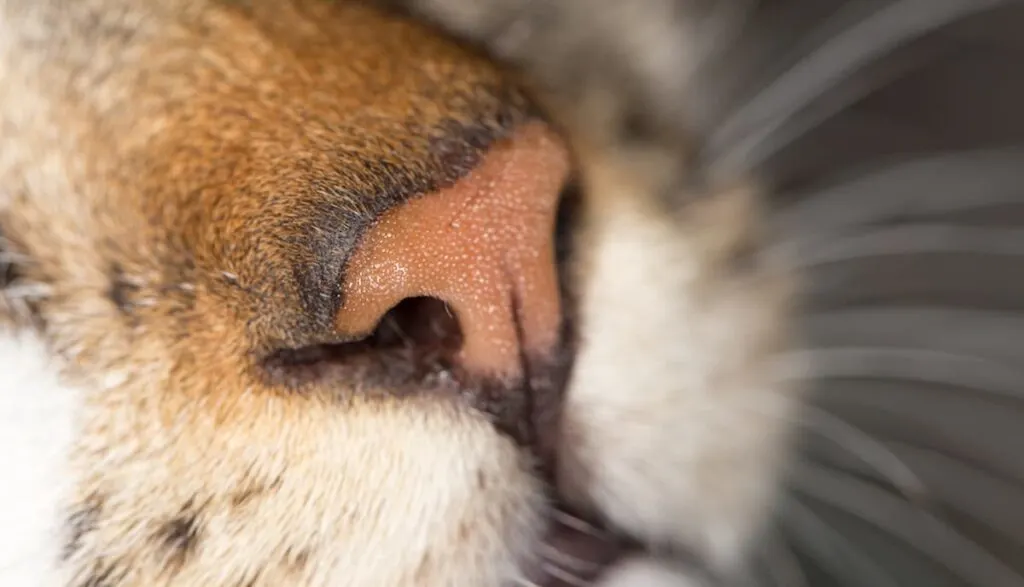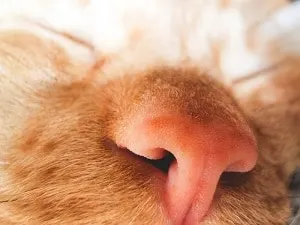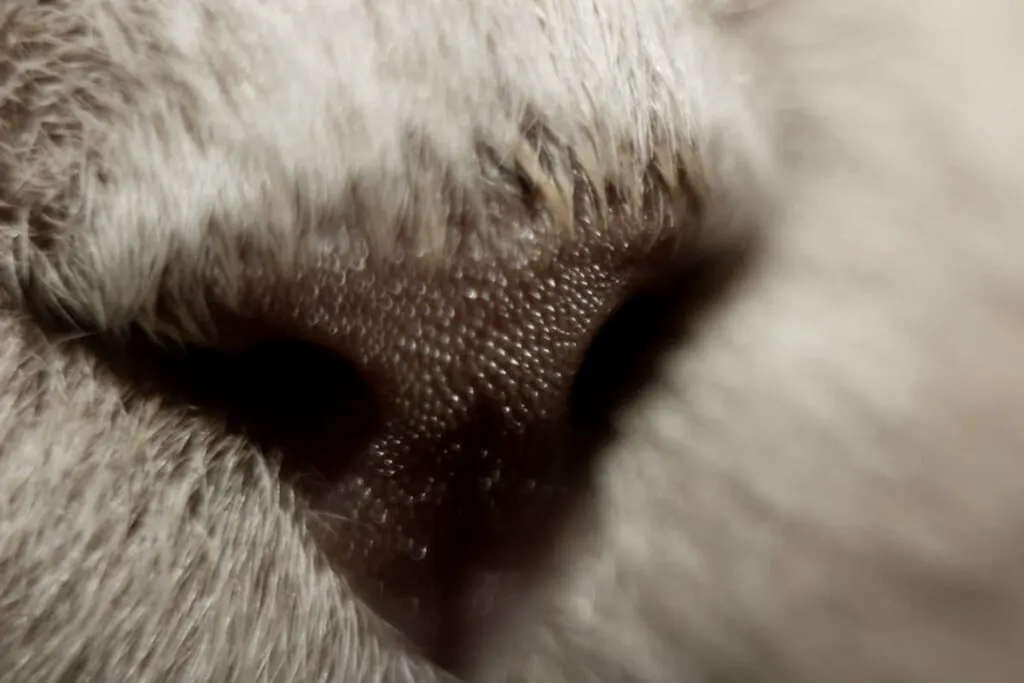As much as you love your feline companions, it’s easy to worry about any new things on their faces, from crust around their eyes to discharge from their nose. Often there are black spots on a cat’s nose, and that can be the reason for concern. So, have you ever thought to yourself, what is the black stuff on my cat’s nose?
The black stuff on your cat’s nose is caused by boogers, mucous nasal discharge from dust, or scabs. Small flecks of dried blood are signs of a bacterial infection. Feline herpes or Lentigo may also be a cause of discoloration of the nose.
It’s a good thing that you’re paying attention too, your cats tears, boogers, and pretty much anything else on their face can be an indicator of their health. Sometimes those bits of discharge tell you that your cat is healthy, while other times, their discharge can be the first sign of trouble and an indication that it’s time to get a vet.

What Causes Black Stuff In My Cat’s Nose
Your cat can have a lot of things that might cause black stuff on or in their nose. Even little scraps of black fabric from one of their favorite toys could look like something you need to be concerned about until you get a closer look.
You should also look closely at any black stuff on your cat’s nose if you routinely wear black clothing or have dark-colored furniture or carpeting. Lint and dust from those dark sources can easily get trapped by the mucous in your cat’s nose and cause a dark-colored discharge.
That’s the mucous doing its job and protecting your cat’s respiratory system. But if it’s a regular occurrence, consider vacuuming or laundering possible sources of the lint, or even keeping your cat away from the source. That’s because black nasal discharge can sometimes be more serious, and you don’t want to miss a sign of illness because of lint.

Another less concerning cause of black spots on your cat’s nose could be if they have a small scratch on the surface of their nose, and the scab has dried. If you have multiple cats in your home, it’s not uncommon to find small scratches on your cat’s faces. Cats are territorial and will often use their claws to get another cat to back off if hissing and fluffing their fur doesn’t work.
Nose scratches are more common on cats when a new cat is first introduced but can happen at any point while two cats are living together.
Your cat may also accidentally scratch their nose while playing around by themselves, especially if your cat is allowed outside.
Your cat’s nose is relatively sensitive, so they may seem a little uncomfortable if it’s scratched. Fortunately, scratches usually aren’t severe. Just keep an eye on them to make sure they’re keeping the scratch clean and aren’t rubbing the area too much. If your cat starts pawing at their face, or their nose seems redder or swollen, it’s time to see a vet in case the scratch is infected.
Is Cat Lentigo Simplex The Cause Of Black Spots On A Cats Nose?
Another possible cause is that your cat’s nose is simply discolored. Lentigo is the development of small areas of hyper-pigmentation on your cat’s skin, and it’s common around your cat’s nose and mouth if the black spot lays flat against your cat’s nose and just looks like part of the skin, congratulations, your cat essentially has a new freckle.
Lentigo isn’t dangerous and doesn’t affect your cat’s health at all. Once you notice one lentigo spot, you’ll likely see more. The spots are like freckles or age spots; your cat is likely to get more but not expected to have any adverse effects from the spots.
More Serious Causes Of Black Stuff On Your Cat’s Nose
There are a couple of more serious causes of black stuff on your cat’s nose. Sometimes a bacterial infection may cause your cat’s mucous to change colors, in which case your cat will probably need to be treated for a respiratory infection.
The black color may be blood again in this case, but it’s usually from irritation in their nose and respiratory passages and can be a sign that your cat is in trouble.
Another cause is from feline herpes. While that may sound incredibly concerning, the good news is that many cats are entirely unbothered by having herpes, and you cannot catch the herpes virus from them.
However, if one of your cats has herpes, it’s likely any other cat in your home also has the virus. It’s important not to expose uninfected cats to your infected one, including that you should keep your cat exclusively indoors after getting a diagnosis.
Herpes does mean that you’ll probably need to wipe away the discharge, and your vet may prescribe some cleaning supplies to help keep the problem under control.
Of course, if you aren’t sure why your cat is getting a nasal discharge (of any color), especially if the discharge is sudden or there is more of it than usual, you should take your cat to the vet. Taking them to the vet is just the best way to make sure your cat stays safe and healthy.
In general, your cat’s nose should be clean and dry most of the time. Some cats do have wet noses, but it’s not very common. If you notice changes to your cat’s nose, it’s best to get a health check just to be safe.

Should I Clean My Cat’s Nose
The short answer is, yes, you should sometimes clean your cat’s nose if they need it. If you have a cat with allergies, for instance, cleaning their nose can help them breathe more easily and keep them a little more comfortable.
Some kittens also need occasional nose cleanings and then outgrow it when they are adults.
Of course, if you need to clean your cat’s nose regularly, it’s a good idea to see a vet and find out why.
Cats are very sensitive in their facial area. That means cleaning their nose requires them to be calm and for you to be gentle.
What About Cat Boogers?
If the nose is experiencing any scabs or boogers, you want to be extra careful not to scratch them or hurt them. Below are a few helpful tips to help you clean your cats nose the right way.
How Should I Clean My Cat’s Nose
Cleaning your cat’s nose might sound daunting, but it’s actually quite easy.
Don’t worry; you won’t need to buy a feline nasal rinse or anything like that. Cleaning your cat’s nose is simple, and you should only clean the outside of their nose. Going inside their nasal passage is not recommended and can be uncomfortable for a cat.
Just take a cotton ball or other very soft material dipped in clean, warm water and gently wipe your cat’s nose. It may help to swaddle your cat in a blanket or a towel before cleaning their nose to help prevent them from squirming or clawing your hand while you do it.
Chances are your cat will run away after you clean their nose. It’s alright; they’ll sulk for a little while before returning to their usual selves.
When cleaning your cat’s nose, consider giving them a treat to calm them. It’s also okay to clean their nose in stages. For a healthy cat, I recommended cleaning their nose at least once per week.
What Can I Give My Cat for Nasal Congestion
First, if you’re concerned enough that you want to give your cat something for nasal congestion, take them to a vet. There may be nothing to be worried about, or your cat may suffer from seasonal allergies. Still, your vet is in the best position to determine whether over the counter treatment is sufficient or whether your cat might need medical care.
Plain saline, washing your cat’s nose occasionally, opening your windows, or getting an air purifier can help reduce your cat’s nasal congestion. Which options are most effective depends on what’s causing the blockage in the first place.
There are also some over the counter options, but you should consult with a vet to find a good match.
If you wind up medicating your cat, be prepared for the medication to come in pill-form or even as drops you place in your cat’s eyes. Some vets recommend crushing pills and mixing the powder with a favorite food or cat treat to make it easier to get your cat to eat it.
Don’t give your cat any medications without consulting your vet on safe options and dosage. Even medicines that are made for cats are usually weight dependent. Some also interact with different breeds differently, so it’s best to check with a vet for appropriate dosing.
Handling Black Boogers In Cats
Black boogers in cats is a normal occurrence, however, if it gets excessive, there are are some things you can do about it:
- Remove the dried mucus
- Limit your cats exposure to air
- Keep your cats nose cleaned regularly
By taking those simple steps, you can remove any buildup caused by dirt or air. Remember, during the cleaning of your cat’s nostrils, it’s important to not put anything directly into it. Instead, use something like a damp cloth to gently remove debris. Some cats may be sensitive in this area, so if you rub too hard, they may react.
What About Black Crust Around A Cats Nose?
Black crust around a cats nose can be handled similarly. Don’t go into the nasal passage, just wipe around it gently. Keep in mind that because the crust has hardened to a degree, it may have caused some scarring or tenderness from sitting in that area too long.
With that in mind, wipe as gently as you can, but loosen the black crust/cat boogers over time. They’ll naturally fall off after some time. This is a good method to use if you have a kitten that has black boogers too. They’re pretty active at that age.
A gentle touch is also helpful if the black crust is around your cats eyes and nose area. You don’t want to end up poking them in the eye by mistake.
It may be helpful to feed your cat treats, or use some calming scents while you do this. The feel of someone’s hands on their nose may not feel comfortable or normal to them at first.
Last Thoughts On Black Spots On Your Cats Nose
So as you can see, black stuff in a cat’s nose can be a combination of many things. It is less likely that your cat is dealing with a serious disease though. Most crust you find in a cat’s nose is from dust or lint from their play toys or carpet in the home.
Occasionally a cat may get a scab from rough play. If you see any wounds, consider taking them to the vet to get them patched up. Most wounds heal quickly and the cat will develop a scab. This is entirely normal.

My name is James, and welcome to FAQCats!
Along with our team of cat owners, expert pet enthusiasts, and pet professionals, we aim to write engaging helpful, engaging content about cats. At FAQCats we strive to provide content that’s accurate and fun to read. Our team writes about everything related to cats; even the most complex of topics. Through extensive research and caring for our own fur-pals, we’re able to provide something cat owners worldwide will love. Have a look around, and leave us feedback anytime!
